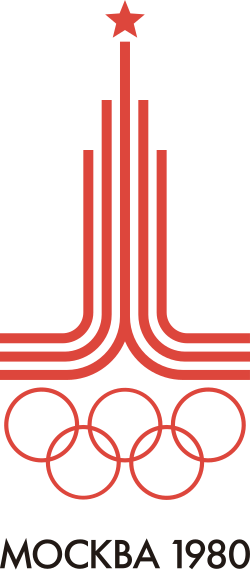1980 Summer Olympics
Games of the XXII Olympiad, in Moscow, USSR From Wikipedia, the free encyclopedia
Remove ads
The 1980 Summer Olympics, officially known as the Games of the XXII Olympiad, were held in Moscow, Soviet Union from July 19 to August 3.

Remove ads
Concerns and controversies

- 1980 Summer Olympics boycott: U.S. President Jimmy Carter instigated a boycott of the games to protest the Soviet invasion of Afghanistan, as the Games were held in Moscow, the capital of the Soviet Union. Many nations refused to participate in the Games. The exact number of boycotting nations is difficult to determine, as a total of 66 eligible countries did not participate, but some of those countries withdrew due to financial hardships, only claiming to join the boycott to avoid embarrassment.[source?] Iran also boycotted the Moscow Games owing to Ayatollah Khomeini's support for the Islamic Conference's condemnation of the invasion of Afghanistan.[3] Only 80 countries participated in the Moscow games, fewer than the 92 that had joined the 1976 games and the lowest number since the 1960 Rome Games which had also featured 80 countries. A substitute event, titled the Liberty Bell Classic, often referred to as Olympic Boycott Games, was held at the University of Pennsylvania in Philadelphia by 29 of the boycotting countries.
This section does not have any sources. (January 2018) |
Sixty-five countries that were invited to the 1980 Olympics, plus Qatar, did not participate for various reasons, including support for the boycott and economic reasons. (Qatar's 1980 IOC recognition came too late for it to be invited.) Taiwan refused to participate as a result of the 1979 Nagoya Resolution, in which the People's Republic of China agreed to participate in IOC activities if Taiwan was referred to as "Chinese Taipei".[4] However, China boycotted the 1980 Moscow Games as well.
 Albania (preparing for the 1992 Olympics)
Albania (preparing for the 1992 Olympics) Antigua and Barbuda
Antigua and Barbuda Argentina
Argentina American Samoa
American Samoa Bahamas
Bahamas Bahrain
Bahrain Bangladesh
Bangladesh Barbados
Barbados Belize
Belize Bermuda
Bermuda Bolivia
Bolivia Brunei
Brunei Canada
Canada Cayman Islands
Cayman Islands Central African Republic
Central African Republic Chad
Chad Chile
Chile China
China Cook Islands
Cook Islands Egypt
Egypt El Salvador
El Salvador Fiji
Fiji Gabon
Gabon The Gambia
The Gambia Ghana
Ghana Haiti
Haiti Honduras
Honduras Hong Kong
Hong Kong Indonesia
Indonesia Iran
Iran Israel
Israel Ivory Coast
Ivory Coast Japan
Japan Kenya
Kenya South Korea
South Korea Liberia
Liberia Liechtenstein
Liechtenstein Malawi
Malawi Malaysia
Malaysia Mauritania
Mauritania Mauritius
Mauritius Monaco
Monaco Morocco
Morocco Maldives
Maldives Netherlands Antilles
Netherlands Antilles Namibia
Namibia Niger
Niger Norway
Norway Pakistan
Pakistan Panama
Panama Papua New Guinea
Papua New Guinea Paraguay
Paraguay Philippines[5]
Philippines[5] Qatar
Qatar Saudi Arabia
Saudi Arabia Singapore
Singapore Somalia
Somalia Sudan
Sudan Suriname
Suriname Swaziland
Swaziland Chinese Taipei (
Chinese Taipei ( Taiwan)
Taiwan) Thailand
Thailand Togo
Togo Tunisia
Tunisia Turkey
Turkey United Arab Emirates
United Arab Emirates United States
United States Uruguay
Uruguay Saint Vincent and the Grenadines
Saint Vincent and the Grenadines Virgin Islands
Virgin Islands West Germany
West Germany Zaire
Zaire
- A 1989 report by a committee of the Australian Senate claimed that "there is hardly a medal winner at the Moscow Games, certainly not a gold medal winner...who is not on one sort of drug or another: usually several kinds. The Moscow Games might well have been called the Chemists' Games".[6] A member of the IOC Medical Commission, Manfred Donike, privately ran additional tests with a new technique for identifying abnormal levels of testosterone by measuring its ratio to epitestosterone in urine. Twenty percent of the specimens he tested, including those from sixteen gold medalists would have resulted in disciplinary proceedings had the tests been official. The results of Donike's unofficial tests later convinced the IOC to add his new technique to their testing protocols.[7] The first documented case of "blood doping" occurred at the 1980 Summer Olympics as a runner was transfused with two pints of blood before winning medals in the 5000 m and 10,000 m.[8]

- Polish gold medallist pole vaulter Władysław Kozakiewicz showed an obscene bras d'honneur gesture in all four directions to the jeering Soviet public, causing an international scandal and almost losing his medal as a result. There were numerous incidents and accusations of Soviet officials using their authority to negate marks by opponents to the point that IAAF officials found the need to look over the officials' shoulders to try to keep the events fair. There were also accusations of opening stadium gates to advantage Soviet athletes, and causing other disturbances to opposing athletes.[9][10][11][12][13]
Remove ads
Medals by country
These are the 10 countries that won the most medals in the 1980 Summer Olympics.
Remove ads
Other websites
References
Wikiwand - on
Seamless Wikipedia browsing. On steroids.
Remove ads

